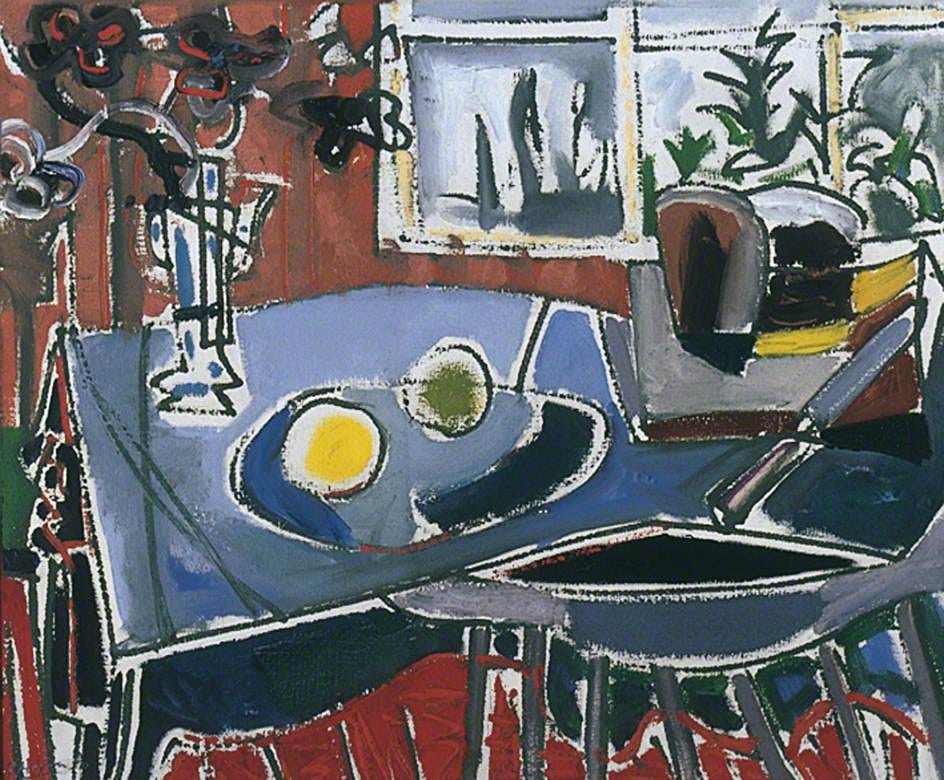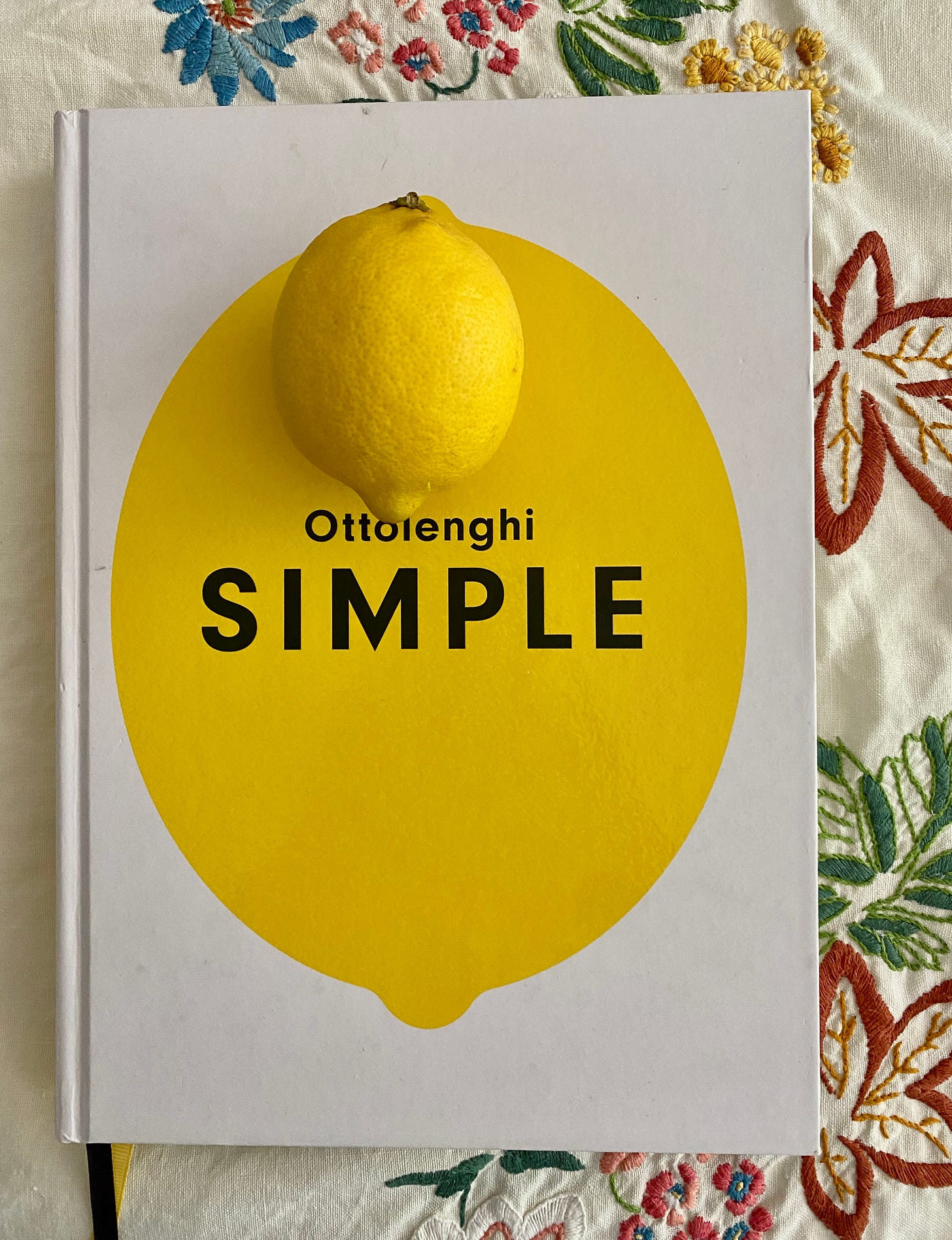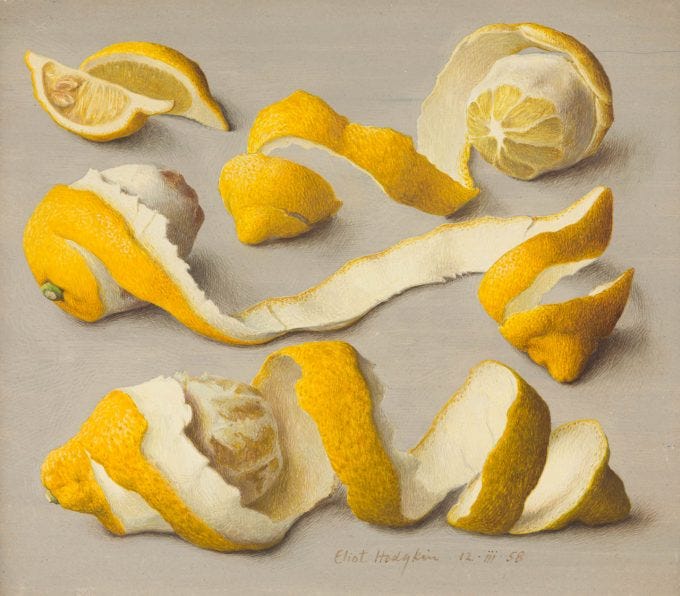I sometimes volunteer at Kettle’s Yard where the first thing a visitor to the house is invited to notice is a single lemon on a large pewter platter.
It’s become something of a shorthand for the Kettle’s Yard aesthetic: clear, fresh, unfussy, ordinary, thoughtful, a focal point, a dot of splash of colour against a neutral, contrasting background. So we put lemons in Simon’s wooden bowls to amuse ourselves; they look lovely but we can hardly claim to have a Kettle’s Yard-style home (Jim Ede did not have a thing about pink).
[‘Anemones and Lemon’ (1950), Patrick Heron - nearly typed Lemon - with a lemon commanding the whole room]
I adore lemons; they are one of my kitchen staples, together with salt, garlic, and chillis. I love their colour, texture, their zest, flavour, usefulness. They bring an element of sunshine and warmth into the kitchen, although to be honest it was years before I realised that they are mostly picked in winter which seems ridiculously counter-intuitive when they are the taste of summer - in lemonade, citron pressé, gin and tonic, lemon sorbet.
[Dieppe market, a very cold Saturday in February]
I also like the way that a lemon is instantly recognisable from its shape or outline alone.
No wonder Yotam Ottolenghi chose to have a huge, shiny, textured lemon on the front of Simple, one of my favourite cookery books. It encapsulates his Mediterranean influences, and the message that a lemon in the kitchen can make everything better. (His blueberry, almond and lemon cake recipe is the best.)
[‘Still Life with Lemon’ (1988) William Scott]
Even a skew-whiff lemon still looks like a lemon, its shape doing all the hard work.
[‘The Lemon’ (1880), Manet]
Lemons certainly seems to bring out the minimalist in many people, even Impressionists,
although it seems others can’t stick to Escoffier’s dictum of keeping things simple (“surtout faites simple”) and letting a lemon speak for itself.
[‘Peeled Lemons’ (1958) by Eliot Hodgkin, who painted lots of lemons]
Then there’s the peel and zest and juice. Never mind diamonds or caviar, I would just be thrilled to have a constant supply of big, juicy Amalfi lemons. Then I could live off lemon tarts, lemon curd, lemon posset, lemon meringue pies, lemon drizzle cakes, lemon cheesecakes, lemon soufflés, lemon polenta cakes, chickens stuffed with lemons, and River Cafe lemon spaghetti. The closest I’ve got to living the dream is when we spent a fortnight in France before having children, and turned it into a search for the best tarte au citron. Believe me, it’s a fine way to structure a holiday. Never mind art, cathedrals, and castles, pâtisserie is the way to go.
[‘Still Life with Lemons’ (1919), Henri Matisse]
Imagine being deprived of them, as people once were. No wonder so many have worshipped Elizabeth David; she was able to evoke the joys of Mediterranean ingredients and cooking during the culinary wasteland of the 1950s. “Hardly knowing what I was doing ... I sat down and started to work out an agonised craving for the sun and a furious revolt against that terrible cheerless, heartless food by writing down descriptions of Mediterranean and Middle Eastern cooking. Even to write words like apricot, olives and butter, rice and lemons, oil and almonds, produced assuagement.” I’m not a fan of Elizabeth David’s recipes, but some of her writing, one collection of which was published with the title I’ll Be With You in the Squeezing of a Lemon, is desert island stuff.
As anyone with a zest for them knows: when life gives you lemons, there’s lots more than lemonade to be made - and celebrated.
Happy Sunday!












All I knew of lemons in my 1960s Highlands of Scotland childhood was the little plastic squeezy Jif lemon, which somehow never, ever ran out. I suppose its usage rate was on a par with the little medicinal bottles of olive and almond oil (for earache ONLY) which resided stickily in the bathroom medicine cabinet along with the Andrew Liver Salts, Milk of Magnesia and Disprin.
Lemons! Have you heard of the Fesole Club Papers? A children’s curriculum written by Collingwood, a student of Ruskin? The first lesson is on drawing a lemon! A woman tried to revive it virtually on Instagram a few years back and quickly got inundated. Try #fesoleclubthelemon to see some of the results, if interested.